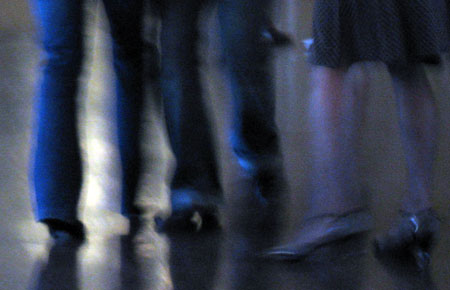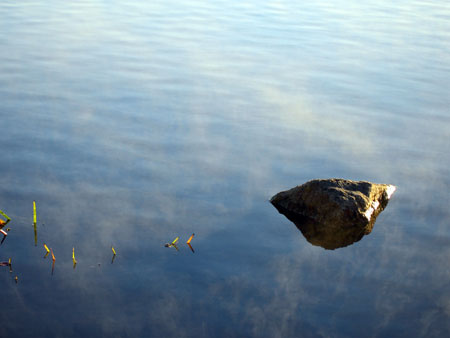
Another Tango weekend! This one was with Tomas Howlin (who has been here previously), an Argentinean living now in Montreal. By the end of Sunday, my feet hurt, but otherwise, it was a totally exciting and worthwhile weekend.
Well, to be honest, there were moments when I felt my whole life walking before me. What I mean is: We rotated partners every two dances. There was an uneven (not to say odd) number of people which meant that someone did not have a partner. And, as I am not a very assertive person, for the first dance it was me, of course, who was odd one out. When Margaret, my teacher here in Halifax, explained we would take turns not having a partner, I just said “It’s the story of my life!” After that, it was okay.
Tomas presented a slide and video show Saturday afternoon. Tango was not the norm in Argentina when he was growing up there, not like it is now. Someone asked him how he became involved in it, He said he was studying philosophy and music at university and his instructor said he wouldn’t teach Tomas to play the Mozart flute sonata until he understood contemporary pop music. After all, Mozart’s music was the popular culture of his time. This lead Tomas to explore pop music, then blues, Jazz and eventually tango. Now tango is a major export of Argentina, even taking root in Nova Scotia, thanks to the industry of Margaret Spore, who brought Tomas here from Montreal.
And I’m going to Montreal the end of the month and hope to take some classes there. I can envision a string, like a paper chain, of tango dancers around the world.
My friend Heidi and I went traipsing around to a few galleries in town last week. There was a fairly big drawing exhibit at the Dalhousie Art Gallery, a strange sculpture show at St. Mary’s University, and Janice Leonard’s well executed landscapes at Studio 21. The artwork was interesting but not earth-shaking which I suppose is good, considering the various natural disasters we have already experienced lately. But it felt more as if most of the work was ideas yet to be hatched. Heidi suggested there be a website where a person could put up an idea and have people comment, make suggestions. That way maybe more fully baked ideas would be on the menu.
When I was first learning to cook, at around twenty years of age, I asked my mother how long it took to cook a pot roast. “Until it’s done,” she told me. I can laugh at this now, but then it was too confusing. Maybe, ultimately, experience/time is the best teacher.
It looks like I’m not going to get that week of good weather I desire so much. We have had a few beautiful days but it's been raining hard a lot lately, and windy. I keep putting off taking the screens down. The lake is over-full, climbing the banks; my dock and boats are in for the winter.
We’re told Wilma will breeze by here today. With 100 km winds and heavy rain. After Juan’s unexpected destruction two years ago, everyone is a bit nervous and preparing for power-outages. Hope she decides it's too cold here and goes off in another direction. And a week in Greece sounds very inviting right now.
As much as I was exceedingly surprised and enchanted with Sue Miller’s Lost in the Forest, her earlier novel, While I Was Gone, was actually a disappointment. It is a very good story, just overwritten. Where her latest novel is spare and direct, poetic and immediate, the earlier one rambles. I used to have a habit of reading ahead most of the time, spoiling any surprise that might have been written into the story, and I haven’t done that in a long time. But I was restless reading this book, and as I have a habit of finishing almost every book I start, I found myself giving in to my old restlessness and reading ahead, thinking maybe that would help.
While I Was Gone explores what behavior is allowable, what “bad” is “good" or "okay,” what is forgivable. If someone does a horrendous act, can he make amends by then “being good, creating good for others” and, on the other hand, if someone has an intention of indiscretion, dishonesty, is that enough to destroy faith in that person? Interesting questions, well developed; just not as well written as I would have liked.
Even so, I am planning to read another of her books that has been recommended to me, The Good Mother. Her stories are interesting, the people real, the situations worthwhile understanding. I probably would have liked this book better if I had read it before Lost in the Forest.
(I had, in fact, given Lost in the Forest to my friend Robin as she was about to go to the library and, before returning it, she read the first few pages, was captivated, renewed it and is now deeply absorbed and enjoying it.)
In the meantime, in my last venture into the library before Tango class, I took out To the Wedding by John Berger, recommended by a friend, a university literature professor. It was a good choice. A very poetic novel, one that speaks alternately through many voices, of a young girl, Ninon, and her travels through love and death. One of the surprises of reading this book, besides the beautiful telling of the story, was a couple of yellow stickie-notes I found throughout the book. The first one read “birds are symbolic of human souls” and then refers to p. 148 “sense of hope from taxi-driver” with whom Ninon’s mother, Zdena, has some warm, brief moments.
The second yellow stickie-note read “the novel’s lost & searching souls, Ninon’s grieving father Jean & her mother, Zdena. Jean & Zdena are regenerated by the power of Gino & Ninon’s timeless love” which allows them to marry and rejoice beyond the knowledge of Ninon’s encroaching illness.
The power of the novel is in its lyrical telling of tragic events that are transformed into a joyous, tender and triumphant wedding of family and community. I’ve known several friends who have died in their thirties and forties, way too early. In each case the relationship to death was different. It is always hard, especially on friends and family left behind, but the main quality that makes it less painful is the attitude of acceptance. And here that quality is magical.


This morning there was a gentle mist on the lake and not a cloud in the sky. Today the sun was warm, almost like summer. This afternoon I went out into my garden to plant some bulbs and clean up before it gets too cold. It�s been such a busy few weeks, I hadn�t been paying much attention to my yard. I was surprised to see some neglected string beans still edible and the zucchini plants are still producing a few fruits. Some cold weather greens are alive and well. We just need another week like this. Then I will be ready to put my winter tires on. Maybe.

This is a very hard time of year. My dock came in last weekend. A very sad day. No more swimming; no more boat rides. The garden is closing down. Now the leaves are turning. It is beautiful yet haunting. I can feel the ghosts from the past in the air. And the possibilities of the extremes of winter are becoming evident everywhere. The sun was strong today, the wind chilling. The sun is late getting out of bed in the mornings. It is dark way beyond the time I expect. It just doesn�t seem right.
I feel like a squirrel getting ready for winter without enough nuts in my nest; I feel the edge of anxieties as I scurry around looking for ways to secure myself before the snows descend. And with so many natural and unnatural disasters in the world, it is hard to trust the sun to rise and the nest to be full.
Maybe this is what Halloween is really about. The ghosts that need to be welcomed and sent on their way. The real beginning of winter. Turning inward, lighting the hearth, warming the home.

Saturday night I went to a party. This one was a birthday celebration for a friend turning fifty-one. The gathering was all women�except for an eleven month old little boy. So inevitably, at one point, the conversation turned to babies and nursing. One mother of a now grown boy told how she had nursed her son until he was twenty-six months, then told him that was it, the milk was all gone. During his second year he frequently asked for a baby brother or sister, then his request disappeared like the milk. When he was seven, he asked again for a sibling. His mother asked him why he wanted a brother or sister. His reply: �Then I could have a drink!�
Another woman who teaches fourth and fifth grade apparently has a sign up in her room at school that reads: "Why do we have flowers?" Apart from the existential question of existence, I think about the beauty of flowers. And then today on Jonathan Goldstein�s WireTap (CBC radio, finally), there were various people of various ages and interests talking about what beauty meant to them--one, a woman who valued her beautiful hands so much she never washed a dish but felt proud to share these beautiful hands by being a hand model. And there was a young teenage girl talking about how beautiful her boyfriend�s hair was, and how beautiful she found people and her words were very beautiful.
In the classroom, my friend, the teacher, annoyed with the tittering about the male and female parts of flowers, told them very directly that yes, they would be talking about sex and it is a normal part of life so they had better get used to it and that was that! And then they calmed down and had some very interesting, thoughtful questions and conversations. But I don�t know really why we have flowers. Maybe we are just lucky.
By chance (coincidence) I happened to hear a rebroadcast of Stanley Coran being interviewed (How Dogs Think, the book I am currently absorbed in) on Bob McDonald�s Saturday program, Quirks & Quarks. Dr. Coran said dogs have the intellectual development of about a two and a half to three year old and the emotional life of a teenager. And this can lead to some very interesting behavior: with the vocabulary of a two year old (150 to 250 words) yet the socializing needs, the pack mentality of a teenager. Interesting indeed!
Interesting, also, is that regular CBC programming has resumed. Although the substitute programming was excellent and appreciated, I am happy to have my old friends back in my house. The lockout is over. Management and Union have agreed. Just in time for hockey season. A timely coincidence!
I went out to dinner a few Friday�s ago, to celebrate Sean�s father�s (who was visiting from England) birthday. There were four of us, and we began to talk about William�s ten days here in Nova Scotia. How exciting it has been for him, the interesting people he has met, the unusual things he has done and seen. How it comes full circle, the circle of events. Underlining the coincidence of meeting: having dinner together with people he hadn�t known two weeks before, celebrating his birthday in a city he had never been in previously, knowing that the circles will expand. Like throwing a pebble into a pond.
At dinner I was telling my friends about reading Erik Fosnes Hansen�s Tales of Protection, a novel that seems to be about connections, about the threads that lead one to do one thing over another. If you didn�t take one path, you would obviously be on another, have met different people, done different things.
It reminds me of the people I have heard about who overslept their alarms or were stuck on a stalled subway and thereby missed being in the towers that fell in NYC on September 11. Or the story a friend told me of a friend of hers who was standing in the checkout line at the grocery store, backed up, bumped into someone, apologized, they started talking and then . . . now they are happily married. Really. And I heard another very funny story about the power of coincidence this morning. My friend had a flat tire. She called CAA. They sent someone out to fix it. He was very kind and had beautiful bedroom eyes. So she prayed (and prayed and prayed) that her car would break down again, and soon. And it did. And now they are living together and deeply connected, more than just his eyes and her tires. So there ya go!
Hansen�s book is in the form of four tales that seem to be separate stories. In the end, it is not quite clear how they merged into one book. Except that the main character is present in the first and last stories. Just like you don�t really know what makes us do or be where we are when it happens. Those coincidences that are auspicious in our lives.
Another interesting section of How Dogs Think was in Stanley Coran�s descriptions of dog training. He described how it is possible to train a puppy without a leash. When the pup is doing an activity that you want to encourage, you praise and reward. For example, if the pup is naturally coming towards you, you can say �Puppy, come� and then as she approaches, say �Good puppy!� and reward the dog when she arrives. The same with sitting. Of course, you have to be very aware of pup�s activities. Catch good behavior and reward it. The timing is essential for proper training.
I was talking to a fellow dog-lover a couple of days ago about teaching and rewards. Telling her about How Dogs Think. She told me she had seen a TV show that showed the value of reward. Two people in an audience were chosen to leave the room, knowing that when they returned, there was something they were supposed to do. The demonstrator then put a pitcher of water and a glass on his table and sat behind it. When the first person was called in, he was greeted warmly. As he approached the desk, he was given encouragement, told how well he was doing. So within a couple of minutes, he knew to fill the glass with water.
On the other hand, when the second person was called in, he was greeted with scolding: �Why are you always so late!� etc. Such harsh words continued from the lecturer. The man never did figure out what he was supposed to do.
Obviously this applies to all classroom education. I find more and more students are overwhelmed with their assignments, feel stress about homework and class work. Considering the statistics in art, how few people actually continue and are able to earn a living, succeed, at this as a chosen field, it would seem that enjoying the luxury of being in school would be paramount. When else will the opportunity and encouragement to make art be so available. And encouragement is definitely a major factor in learning.
In between a few novels, I�ve been reading How Dog�s Think by Stanley Coren. As an inveterate dog-lover, it�s been very enlightening to me. It�s an intense little book, full of information that pertains not only to dogs but, in my mind, to people as well. About proper socialization, learning and training. If a dog is not properly exposed to socialzing at a particular stage of its development, somewhere between three and twelve weeks, then they never learn these skills. It does make me wonder about people as well.
One thing that impressed me was when he commented that prenatal influences on dog personalities: if a male dog is in a litter of mostly females, he has more female traits and vice versa. That was true of two of my dogs, Katie and Sebastian. I had them both at the same time, for three years (before Sebastian died prematurely). From a litter of mostly males, Katie was the dominant dog. She could (and did) win any dog fight. In the neighborhood of Duncan�s Cove, where we lived at the time and where there was a large, congenial dog community, she was always the top dog. Sebastian, from a litter of mostly females (and twice her size), was gentler, more docile. He would happily go along with any mischief she devised. And there was plenty.
Next time I get a dog, I�ll have more to think about beforehand.
It�s been taking longer to get my mojo back than I expected. I�m still feeling under the weather, so to speak (although we have been having some spectacular warm days). So yesterday, I thought if I �did something� then maybe I would feel better. Since I had some large zucchini from my garden (too big to eat and I am tired of zucchini bread right now) I made some zucchini chutney. The chutney turned out, looks good, tastes good, but I still feel like I am dragging my tail. O well. . .

The water was still as glass and the sky was clear:

The reflections in the water made paintings:

If you look around, want to find out, are curious enough, there are a lot of interesting, unusual things happening in the little town of Halifax. It�s not like New York, not like Montreal, where it's frontal, in bold type, where there is so much to choose from. Here it is pockets of exquisite surprises.
Last night my friend Inge took me to an �event.� She had told me to dress warm and bring a flashlight. That was all I knew beforehand. (Well, as it turned out my flashlight, a fancy one I had bought to get me through all the possible blackouts in the future, the batteries faded just as I needed them!) We had dinner first and then went up Citadel Hill, into the fortress, across the field, up the ramp, around a corner, down some stairs into a dank basement gun room, once a prison, now a concert hall lit with candles. And, to my surprise, one of the performers was Peter Togni, the moderator on the CBC Weekender program, one of my favorite shows, one of my favorite voices on the radio, on of my favorite Canadian composers. And furthermore, it turns out that the Tognis had been the previous owners of Inge�s house and their children had gone to school together. This is when I love living in a place like this, when the links grow longer and more intimate.
The concert was entitled New Music In New Places: Comtemplative explorations on Gregorian Chant, presented by the Canadian Music Centre. The performers were Peter Togni, Jeff Reilly, and Christoph Both. They played their improvised, abstract, continuous, sometimes wailing, sometimes gentle, sometimes melodic music for an hour without stopping. There were times when I would have liked to bottle the music and take it home with me. At other times, I was happy to leave the strange music within the confines of the strange concert hall. As we slowly found our way down the hill in the dark, the evening felt warm and perfect, even without the flashlight.